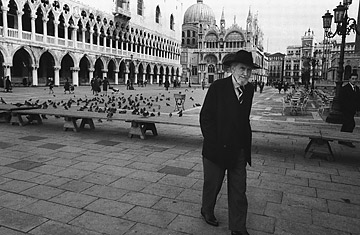
The American poet Ezra Pound strolls through a square in Venice in March 1964
The American poet Ezra Pound might seem a strange sort of inspiration for a group of Italian neo-fascists. That is, until one remembers that Pound was an admirer of Benito Mussolini, a defender of Adolf Hitler and, that while living in Italy during World War II, he broadcast a series of anti-Semitic radio addresses calling for American neutrality. Indeed, so stirring has the poet's memory proved in right-wing circles that Italy's most prominent neo-fascist organization has named itself in his memory: CasaPound, or Pound's House.
The group was formed in 2003 when activists occupied a vacant government building not far from Rome's train station, seizing the property as a squat for homeless Italians and setting up their headquarters inside. Pound's name was chosen not only because he sympathized with Italy's wartime government, but also for his criticism of global capitalism, which the occupiers found useful to buttress their arguments for seizing the unused offices. "Ezra Pound said that property we don't use becomes a sort of financial capital," says Simone di Stefano, one of the group's founders. "For us, rent is a form of usury."
Today, the building's facade is clad in large marble letters, spelling out the group's name in the imperial Roman style: CASAPOVND. Visitors enter through a hall decorated with Mussolini's fascist eagle and the names of thinkers that serve as the group's inspiration: from Plato to Dante, Nietzsche and Ray Bradbury. On the first floor lie offices, radio studio, dormitories, and a corridor decked with pictures of their patron poet. The next five floors have been converted to apartments. An exhibit dedicated to women in history winds up the stairs, its subjects ranging from Rosina Ferrario, Italy's first woman aviator, to the German propagandist Leni Riefenstahl. At the top sits a conference room, where CasaPound holds its meetings.
The use of Pound's name by an openly fascist group has not sat well with the poet's descendents, who argue that the artist who promoted African-American music and translated Chinese poetry should not be reduced to a single, dark period of his life. "We, the family, do not believe that Pound was a fascist poet," says Siegfried de Rachewiltz, the writer's grandson. Pound's anti-Semitism was both a reflection of contemporary currents and misguided bigotry motivated by his conflation of Judaism and global finance. "The fact is that he punished himself for that," says de Rachewiltz. "He realized that it had botched his life work. And so the last 10 years of his life were spent in this self-imposed silence."
In December, a 50-year-old accountant with ties to CasaPound opened fire on a group of Senegalese street vendors in Florence, killing two men and injuring three before killing himself in a nearby parking garage. Though the fascist group was quick to disassociate itself from the murderer's actions, Pound's daughter, Mary de Rachewiltz, filed suit, asking an Italian court to force the organization to stop using the poet's name. "Pound never espoused violence," says Siegfried de Rachewiltz. "Today one has a duty to truly distance oneself from anything that can be associated with racism and xenophobia."
The irony is that CasaPound doesn't seem to disagree. While many of those who associate with the group may have racist leanings or dabble in Holocaust revisionism, the organization's official position is one of tolerance. In addition to renouncing violence for anything other than the defense of its right to protest, the group has endorsed civil unions for homosexuals and decried anti-Semitism. Though its platform supports tight immigration control, it also calls for the regularization of those already in Italy and citizenship for those who grew up there. In December, CasaPound held a meeting with the large Chinese community in the area around the group's headquarters. Its position: a desire to see the neighborhood become an American-style Chinatown, with restaurants and lights and Asian decorations. Fascism, like Pound, says di Stefano, was led astray by what he calls "the errors of the past century." Adds Adriano Scianca, the group's director for culture: "Anti-Semitism was a component of fascism. But it wasn't a necessary component of fascism."
Indeed, when talking about the poet, the group sometimes sounds no different from members of his family. "He always specified that there were directors of the banks that weren't Jewish," says Scianca. Adds the group's director of external affairs, Sebastian Manificat: "He made hours of tapes, and people tend to only take out only the anti-Semitic parts." The fascist group is fighting the poet's family's lawsuit. "Pound and his poetry are universal heritage," says Scianca. "They belong to everyone." After the war, Pound was arrested for treason by the American forces and spent 12 years in a psychiatric hospital in Washington, D.C. Scianca points to a famous picture of Pound on his return to Italy in 1958, holding up his arm in what appears to be the fascist salute. "It's important to remember that he renounced anti-Semitism, but never fascism," says Scianca.
